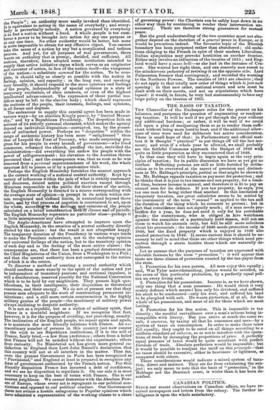THE BASIS OF TAXATION.
Tan Chancellor of the Exchequer relies for the present on his balances, and postpones the question of augmenting or readjust- ing taxation.. It will be well if we get through the year without any additional burdens ; or rather, it will be well if we could fall upon a plan of readjusting them so as to render them suffi- cient without being more hard to bear, and if the additional allow- ance of time were used for deliberate but active consideration. There is small hope of that: in Parliamentary and official mat- ters it fs thought " practical" to put things off till the last mo- ment; and even if a whole year be allowed, we shall probably see the faithful Commons approach the Budget of 1849 with quite as little preparation as they encountered that of 1848.
In that case they will have to begin again at the very prin- ciples of taxation; for in public discussion we have as yet got no further. Reflecting persons are still so little fortified by delibe- ration as to be overawed at the aspect of precision and distinct- ness in Mr. Babbage's principle, partial as that might be shown to be. Mr. Babbage regards taxation as payment for protection ; and he thinks that it is just to tax income and not property, for a limit- ed time, because income is annual, and therefore it is fit to pay an annual sum for its defence. If you tax proppeerty, he says, you tax one man for being richer than another. In this limitation of temporary taxation, our great calculator seems to be misled by the community of the term " annual" as applied to the tax,and the duration of the thing which he consents to protect: but in fact that coincidence does not signify much ; if a man needs pro- lectdon for a year, he does not need it only for his perishable goods; the nurseryman, Who is obliged to hire watchmen against the casualties of a particularly hard season, will not net them to watch his annuals only, but will be still more solicitous about his perennials : the income of 1848 needs protection only in 1848, but the fixed property which is enjoyed in 1849 also needed protection in 1M8. It seems curious that it should be ne- cessary to call to mind that there are other things which need pro- tection through a storm besides, those which are naturally de- ciduous.
Let us assume that the purposes of taxation are expressed with tolerable fairness by the term " protection " : it will appear that there are three classes of protection exacted by the tax-payer from the state.
1. Protection for his own person. All men enjoy this equally ; and, Wat Tyler notwithstanding, justice would be satisfied, on the score of this particular protection, by a perfectly equal poll- tax on every living soul.
2. Protection for his possessions. Income is, as we have shown, only one thing that a man possesses. He would think it very scanty defence which secured himonly his dividend, and suffered his stock to be confiscated—only his rent, and suffered his land to be ploughed with salt. He wants protection, if at all, for the whole of his possessions, and most of all for those which are moat lasting. 3. Protection for his free action. This is impossible to tax directly ; the needful surveillance over a man's actions being in- compatible with liberty. But you arrive at much the same re- sult, a converso, by taxing all that he consumes and uses—by a system of taxes on consumption. In order to make those taxes fall equally, they ought to be rated on all things according to a uniform standard ad valorem, so as not to interfere with the opera- tions of trade by deranging the proportions of price. A perfectly equal pressure of taxes would be quite accordant withperfect freedom of trade. Absolute perfection would be impossible; but it would be possible to readjust the tariff on this principle—that no taxes should be excessive, either in heaviness or lightness, as compared with others. These considerations would indicate a mixed system of taxa- tion, direct and indirect. They are far from exhausting the sub- ject : we only mean to note that the basis of " protection," in the Babbage not the Bentinck sense, is wider than it has been de- scribed.


























 Previous page
Previous page